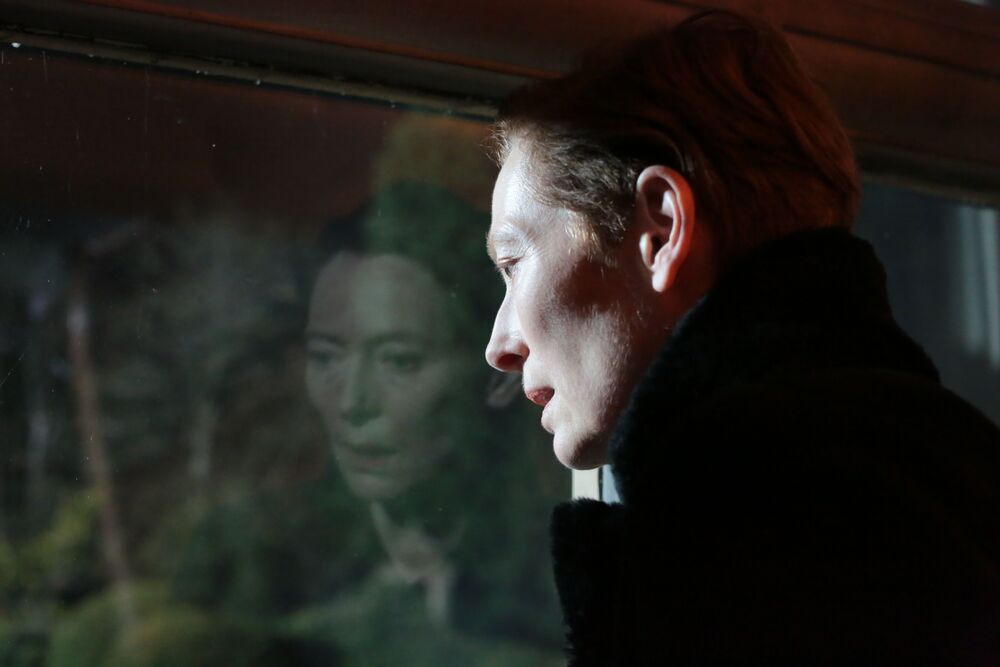Capsule reviews for Dec. 2

Tilda Swinton stars in THE ETERNAL DAUGHTER. (Photo: A24 Films)
Darby and the Dead
The stakes are technically life-and-death, but despite a somewhat ambitious premise, this romantic comedy provides only the slightest twist on a predictable formula. Darby (Riele Downs) is a sardonic teenager whose near-death experience years ago enabled her to interact with ghosts transitioning to the afterlife. After a rival classmate (Auli’i Cravalho) perishes in a freak accident, she manipulates Darby’s quest for popularity to wield power from beyond, as her boyfriend (Asher Angel) complicates things. The cast is engaging and the thin premise yields some scattered laughs. But the film stumbles when reaching for a more profound exploration of grief, mortality, and being true to yourself. (Rated PG-13, 100 minutes).
The Eternal Daughter
Leave it to director Joanna Hogg (The Souvenir) and the versatile Tilda Swinton to turn a slight diversion into a deeply atmospheric and quietly powerful exploration of guilt, regret, maternal instincts, and the creative process. Swinton plays both a struggling artist and her elderly mother, whose birthday prompts a trip to a former family estate, now converted into a boutique hotel. Their uneasy stay, however, brings lingering hostilities to the surface as secrets are revealed. Even as it becomes narratively muddled down the stretch, this haunting and meticulously crafted probe of relationships and intergenerational bonds is nimble enough to avoid bogging down in relentless heartache. (Rated PG-13, 96 minutes).
Four Samosas
Infusing a familiar framework with rich cultural specificity, this scrappy romantic comedy compensates for its low-budget constraints with endearing characters and freewheeling charm. It follows fledgling hip-hop wannabe Vinny (Venk Potula), whose ex-girlfriend is set to marry a smarmy rival (Karan Soni). So he conspires with three friends to steal the diamonds earmarked for the ceremony, thereby giving Vinny a chance to win her back. But of course, the plan goes comically off course. Striking a balance between silly and sincere, the screenplay by director Ravi Kapoor playfully tweaks Bollywood tropes and Indian-American traditions. The breezy and amusing result crosses ethnic and geographic boundaries. (Rated PG-13, 80 minutes).
Hunt
Amid all the visual flourishes and adrenaline-fueled set pieces in this Korean espionage thriller, you might overlook the narrative incoherence and flat characters. At least that what actor Lee Jung-jae (“Squid Game”) is hoping with his ambitious if uneven directorial debut set against a backdrop of 1980s sociopolitical turmoil. Lee stars as a high-ranking South Korean intelligence agent investigating his ranks for a suspected mole from North Korea who is leaking government secrets that threaten national security, culminating in a potential plot to assassinate the president. All of the twists and third-act revelations generate surface tension to offset a lack of meaningful depth or intrigue. (Not rated, 131 minutes).
Last Film Show
An unabashed tribute to the power of cinema, this crowd-pleasing Indian drama is thematically familiar — the great Cinema Paradiso seems an obvious influence — yet delivers a heartfelt dose of nostalgic charm. It follows a young boy (Bhavin Rabary) from a rural village who becomes transfixed after watching Bollywood productions at his local theater, so he befriends the projectionist (Bhavesh Shrimali) and learns enough to create a makeshift projection system of his own with his buddies. But as he immerses himself in fantasy, the world is changing around him. The screenplay by director Pan Nalin (Samsara) is modest yet richly textured, and the sumptuous visuals are enchanting. (Not rated, 111 minutes).
Lowndes County and the Road to Black Power
Even after passage of the Civil Rights Act in 1965, one Alabama county had 80 percent Black residents but zero Black voters. That’s the focus of this insightful and appropriately infuriating documentary that serves as a captivating history lesson with contemporary relevance. Mixing archival footage with interviews with locals, the film illustrates how “Bloody Lowndes,” as it was known at the time, became a focal point for voter suppression plus representation, and the rise of nonviolent protest groups. Connecting past and present, the film powerfully casts a new light on the civil rights struggle while saluting the power of grassroots activism in creating change. (Not rated, 90 minutes).
Second Chance
Richard Davis is both an innovator and a huckster, as passionate about saving lives as he is about selfishly protecting his own image. Such contradictions drive this captivating documentary from director Ramin Bahrani (Goodbye Solo) about the Michigan man who invented the modern bulletproof vest in the 1970s. He consistently demonstrated his products by shooting himself at point-blank range and grew an empire from selling to law enforcement. But behind the scenes, Davis’ penchant for exaggerations and contradictions caught up to him. Bahrani balances the various angles in his subject’s life story while layering it with a topical examination of gun culture and police aggression. (Not rated, 89 minutes).